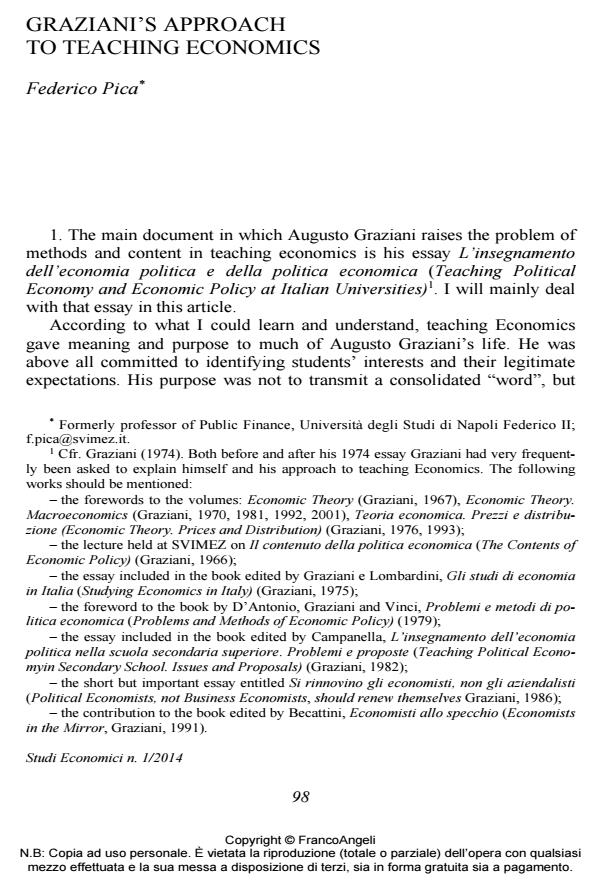Graziani’s approach to teaching economics
Journal title STUDI ECONOMICI
Author/s Federico Pica
Publishing Year 2015 Issue 2014/112
Language English Pages 11 P. 98-108 File size 51 KB
DOI 10.3280/STE2014-112008
DOI is like a bar code for intellectual property: to have more infomation
click here
Below, you can see the article first page
If you want to buy this article in PDF format, you can do it, following the instructions to buy download credits

FrancoAngeli is member of Publishers International Linking Association, Inc (PILA), a not-for-profit association which run the CrossRef service enabling links to and from online scholarly content.
Graziani states that teaching is not and cannot be a neutral science. Teaching and research result from the ideological and conceptual approach of the lecturer, from their social sensitiveness, from their ability to deal effectively with the issues which they consider "topical, current, relevant". This is not a mere theoretical enunciation, but a rule which Graziani follows and applies to a number of different issues, such as the role of welfare distributionin economic science, the problems in the measurement of real income, the effects of changes in taxes on the aggregate demand. In this latter regard, it can be shown that Graziani’s approach leads to the conclusion that certain operations, such as the tax cut of 80 Euros funded by reductions in public spending, cannot produce an increase, but a reduction in the aggregate demand.
Jel codes: B31, A20
- Graziani A. (1957), Lo Stato fattore di produzione (The State as a Factor of Production), “Rassegna Economica”, XXI, 3, pp. 469-477.
- Graziani A. (1966), Il contenuto della politica economica (The Contents of Economic Policy), Svimez, Rome.
- Graziani A. (1967), Economic Theory, Edizioni Scientifiche Italiane, Naples.
- Graziani A. (1970), Economic Theory. Macroeconomics, 2nd ed., Edizioni Scientifiche Italiane, Naples (3rd ed., 1981 – 4th ed., 1992 – 5th ed., 2001).
- Graziani A. (1974), L’insegnamento dell’economia politica e della politica economica nell’Università italiana (Teaching Political Economics and Economic Policy at Italian Universities), “Rendiconti del Comitato Veneto per il potenziamento degli studi economici e per la programmazione”, IX, Edizioni Canova, Treviso, pp. 95-115, 155-160. Graziani A. (1975), Rapporto sullo stato degli studi di economia (Report on the State of Economic Studies), in A. Graziani, S. Lombardini (eds.), Gli studi di economia in Italia, Edizioni di Comunità, Milan, pp. 13-39.
- Graziani A. (1976), Economic Theory. Prices and Distribution, 2nd ed., Edizioni Scientifiche Italiane, Naples (3rd ed., 1993).
- Graziani A. (1979), Introduzione (Introduction), in M. D’Antonio, A. Graziani, S. Vinci, Problemi e metodi di politica economica, Liguori, Naples, pp. 11-35.
- Graziani A. (1982), Qualche riflessione sull’insegnamento borghese di una scienza sociale (Some Thoughts on the Bourgeoisie Teaching of a Social Science), in F. Campanella (ed.), L’insegnamento dell’economia politica nella scuola secondaria superiore. Problemi e proposte, Franco Angeli, Milan, pp. 37-42.
- Graziani A. (1986), Si rinnovino gli economisti, non gli aziendalisti (Economists, not Business Economists, should renew themselves), “Economia e Politica Industriale”, XIII, 50, June, pp. 33-35.
- Graziani A. (1989), L’Italsider e l’economia napoletana (Italsider and the Neapolitan Economy), “La Città Nuova”, VI, 3-4, May-August, p. 11-15.
- Graziani A. (1991), Sull’insegnamento universitario dell’economia politica (On University Teaching of Political Economy), in G. Becattini (ed.), Economisti allo specchio, Vallecchi, Florence, pp. 19-24.
Federico Pica, Graziani’s approach to teaching economics in "STUDI ECONOMICI " 112/2014, pp 98-108, DOI: 10.3280/STE2014-112008